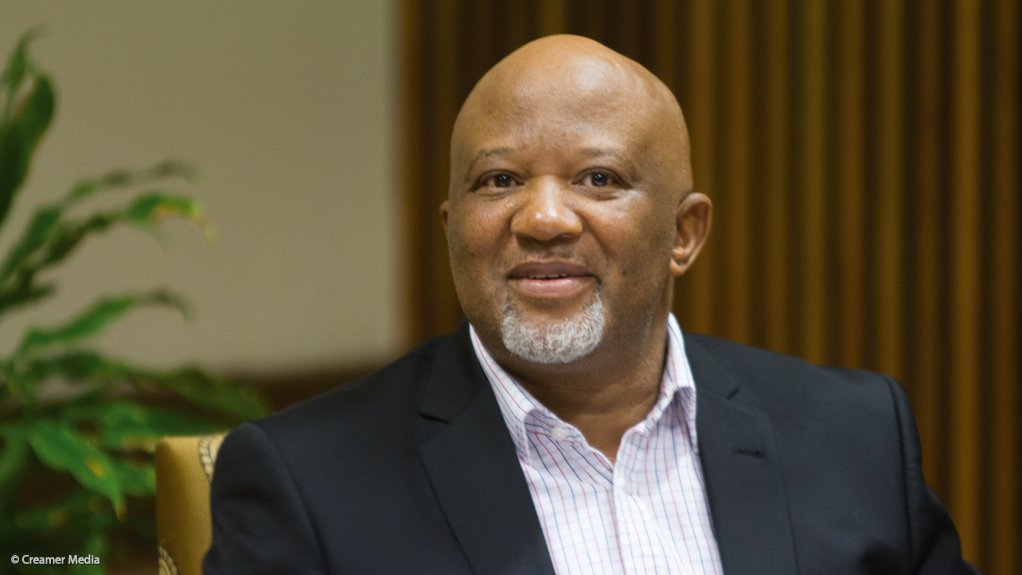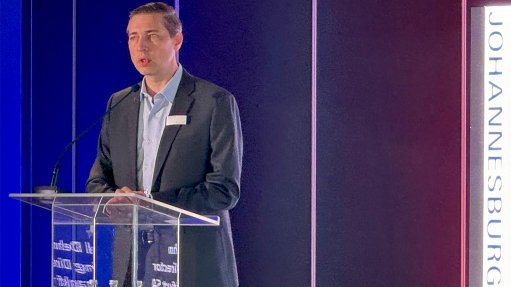High-level executives discuss shortcomings in govt’s BBBEE support


MTN chairperson and former deputy Finance Minister Mcebisi Jonas
Photo by Creamer Media
While government has made meaningful strides with supporting the participation of more black-owned companies in the economy in the 19 years since the promulgation of the Broad-Based Black Economic Empowerment (BBBEE) Act, there remain barriers to these companies getting set up and thriving.
In a panel discussion hosted at the Black Industrialists and Exporters Conference on July 20, Finance Minister Enoch Godongwana and Trade, Industry and Competition Minister Ebrahim Patel asked senior executives what they thought was lacking in the BBBEE space.
The panel members, including Women’s Investment Portfolio Holdings executive director Gloria Serobe, Industrial Development Corporation chairperson Busi Mabuza, JSE-listed retail group Massmart chairperson Kuseni Dlamini and African Women Chartered Accountants Investment Holding Company chairperson Sindi Mabaso-Koyana, concurred that more venture capital or angel investors are needed to finance black businesses.
While the panel members agree that current policies and frameworks are sound for the most part, they recommended that government and private sector institutions work to fill the financing gaps for small businesses.
Mabaso-Koyana mentioned that corruption tied to tenders and late payment on government’s part were also holding back black-owned businesses, and any business for that matter, from keeping afloat and/or growing.
She said it did not help the economy if only a select few individuals benefit from BBBEE deals.
Telecommunications giant MTN chairperson Mcebisi Jonas agreed, saying that BBBEE had sometimes tended to focus on rent-seeking.
He said a greater share by black-owned businesses was needed in the productive economy and that “black wealth” needed to be spurred on by the private sector as well, not just government.
Mabuza remarked that, if development finance institutions or banks were going to decline a financing application, they should at least provide reasons so that applicants could renew their efforts.
She also suggested that the rejecting institution refer the applicant to an appropriate institution or instruments where they can seek assistance.
On this point, Black Business Council president Elias Monage added that financial institutions were not providing enough reason as to why small business applications were rejected and, therefore, hindered a valuable learning experience.
Monage and Serobe both emphasised that there was insufficient information being shared with township entrepreneurs on how to go about applying for financing or mentoring.
Serobe recommended that fellow industrialists that have succeeded should “go home” and educate others on the language and requirements required for loan applications or starting up a business correctly.
Monage said successful black-owned companies were not bringing along their counterparts often enough by sharing information about market opportunities for example.
Dlamini echoed this sentiment, adding that large corporates should move away from tick-boxing and simply giving ownership to black individuals without a skills transfer of sorts to ensure they meaningfully contribute or get involved in other businesses.
He also mentioned that ownership or businesses would not be successful if individuals did not work hard and persistently at success, which was a mindset often lacking in entitled individuals.
“It is up to community leaders or family leaders to correct that mindset and set the tone for true empowerment.”
On this note, Jonas added that public education on what economic development entails was necessary, in getting people actively involved in creating their prosperity.
Jonas also deemed it vital that BBBEE support on government’s part start focusing on regional trade and programmes and, for example, assist black-owned companies that are looking to set up regional trade infrastructure.
Industrial manufacturing company Siemens South Africa CEO Sabine Dall’Omo also advocated for more roads to be built to connect African countries and businesses with each other.
Congress of South African Trade Unions president Zingiswa Losi similarly said more intentional investment was needed, particularly from institutions such as the Public Investment Corporation.
She questioned why workers’ pensions were not being spent in their home towns where development was most necessary.
Mabaso-Koyana highlighted the opportunity of including more black-owned businesses in up-and-coming sectors, such as biofuels, renewable energy and financial technology.
She elaborated that black-owned businesses needed access to and support in new sectors.
Anglo American South Africa chairperson Nolitha Fakude agreed, saying there were obvious new opportunities to bring black industrialists on board, particularly in the energy space, considering where the world was going.
She suggested that government could support targeted research into how black-owned businesses can form part of a value chain, such as solar panels, for example. “Understand which parts of the value chain [from manufacturing to installation to recycling] can be unlocked for the highest number of people.”
Monage, on this topic, said government ought to consciously define sectors that need more black industrialists, and act accordingly in their promotion and incentives, such as pharmaceuticals – an industry with low levels of black ownership.
Losi felt it necessary that more localisation initiatives be opened up for black-owned businesses in townships. She gave an example of how retrenched skilled experts in the automotive sector often start up service centres in townships, but are not often considered as service partners for bigger companies – the same big companies that these experts worked for.
On the enforcement front, Monage said not enough was being done to curb BBBEE fronting, and he believed the appropriate commissions should be “beefed up” to deal with this phenomenon that does not generate true growth in the economy.
Fakude also suggested that government increase its monitoring and enforcement of delivery on empowerment commitments.
Dall’Omo noted that since BBBEE speaks to the “social” aspects of the environment, social and governance, or ESG, agenda, it should not be viewed as a race agenda, which is often the case, but rather a change agenda.
She wished for more reliable government contracts, particularly from State-owned enterprises, as Siemens itself had failed to fully support black-owned suppliers in State contracts with Siemens that do not pan out.
Patel concluded that this kind of input was helpful in developing a social compact for greater growth, investment and jobs, and said government remained committed to greater levels of localisation of production and industrialisation.
Comments
Press Office
Announcements
What's On
Subscribe to improve your user experience...
Option 1 (equivalent of R125 a month):
Receive a weekly copy of Creamer Media's Engineering News & Mining Weekly magazine
(print copy for those in South Africa and e-magazine for those outside of South Africa)
Receive daily email newsletters
Access to full search results
Access archive of magazine back copies
Access to Projects in Progress
Access to ONE Research Report of your choice in PDF format
Option 2 (equivalent of R375 a month):
All benefits from Option 1
PLUS
Access to Creamer Media's Research Channel Africa for ALL Research Reports, in PDF format, on various industrial and mining sectors
including Electricity; Water; Energy Transition; Hydrogen; Roads, Rail and Ports; Coal; Gold; Platinum; Battery Metals; etc.
Already a subscriber?
Forgotten your password?
Receive weekly copy of Creamer Media's Engineering News & Mining Weekly magazine (print copy for those in South Africa and e-magazine for those outside of South Africa)
➕
Recieve daily email newsletters
➕
Access to full search results
➕
Access archive of magazine back copies
➕
Access to Projects in Progress
➕
Access to ONE Research Report of your choice in PDF format
RESEARCH CHANNEL AFRICA
R4500 (equivalent of R375 a month)
SUBSCRIBEAll benefits from Option 1
➕
Access to Creamer Media's Research Channel Africa for ALL Research Reports on various industrial and mining sectors, in PDF format, including on:
Electricity
➕
Water
➕
Energy Transition
➕
Hydrogen
➕
Roads, Rail and Ports
➕
Coal
➕
Gold
➕
Platinum
➕
Battery Metals
➕
etc.
Receive all benefits from Option 1 or Option 2 delivered to numerous people at your company
➕
Multiple User names and Passwords for simultaneous log-ins
➕
Intranet integration access to all in your organisation


















